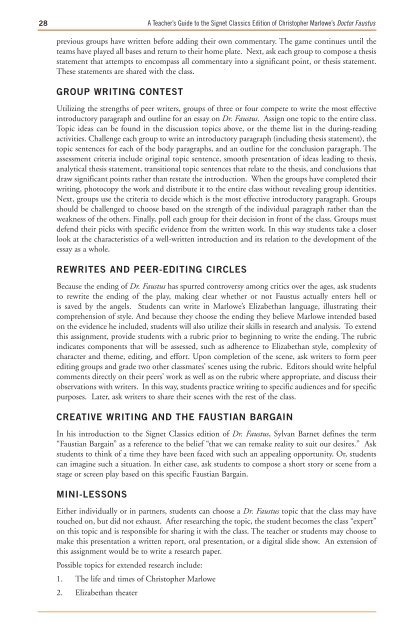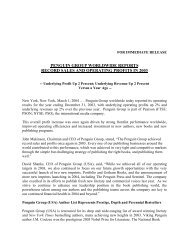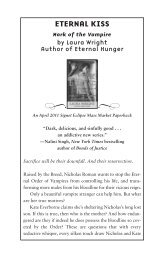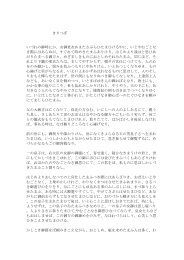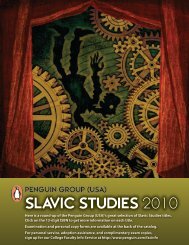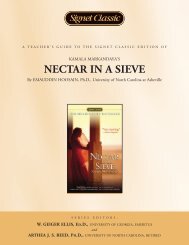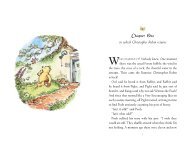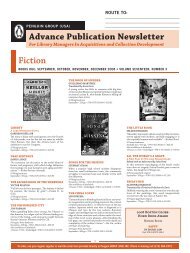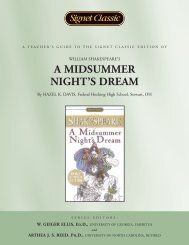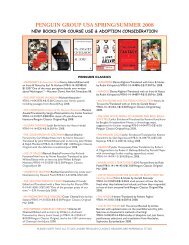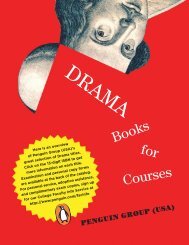Christopher Marlowe's Doctor Faustus - Penguin Group
Christopher Marlowe's Doctor Faustus - Penguin Group
Christopher Marlowe's Doctor Faustus - Penguin Group
Create successful ePaper yourself
Turn your PDF publications into a flip-book with our unique Google optimized e-Paper software.
28<br />
A Teacher’s Guide to the Signet Classics Edition of <strong>Christopher</strong> Marlowe’s <strong>Doctor</strong> <strong>Faustus</strong><br />
previous groups have written before adding their own commentary. The game continues until the<br />
teams have played all bases and return to their home plate. Next, ask each group to compose a thesis<br />
statement that attempts to encompass all commentary into a significant point, or thesis statement.<br />
These statements are shared with the class.<br />
GROUP WRITING CONTEST<br />
Utilizing the strengths of peer writers, groups of three or four compete to write the most effective<br />
introductory paragraph and outline for an essay on Dr. <strong>Faustus</strong>. Assign one topic to the entire class.<br />
Topic ideas can be found in the discussion topics above, or the theme list in the during-reading<br />
activities. Challenge each group to write an introductory paragraph (including thesis statement), the<br />
topic sentences for each of the body paragraphs, and an outline for the conclusion paragraph. The<br />
assessment criteria include original topic sentence, smooth presentation of ideas leading to thesis,<br />
analytical thesis statement, transitional topic sentences that relate to the thesis, and conclusions that<br />
draw significant points rather than restate the introduction. When the groups have completed their<br />
writing, photocopy the work and distribute it to the entire class without revealing group identities.<br />
Next, groups use the criteria to decide which is the most effective introductory paragraph. <strong>Group</strong>s<br />
should be challenged to choose based on the strength of the individual paragraph rather than the<br />
weakness of the others. Finally, poll each group for their decision in front of the class. <strong>Group</strong>s must<br />
defend their picks with specific evidence from the written work. In this way students take a closer<br />
look at the characteristics of a well-written introduction and its relation to the development of the<br />
essay as a whole.<br />
REWRITES AND PEER-EDITING CIRCLES<br />
Because the ending of Dr. <strong>Faustus</strong> has spurred controversy among critics over the ages, ask students<br />
to rewrite the ending of the play, making clear whether or not <strong>Faustus</strong> actually enters hell or<br />
is saved by the angels. Students can write in Marlowe’s Elizabethan language, illustrating their<br />
comprehension of style. And because they choose the ending they believe Marlowe intended based<br />
on the evidence he included, students will also utilize their skills in research and analysis. To extend<br />
this assignment, provide students with a rubric prior to beginning to write the ending. The rubric<br />
indicates components that will be assessed, such as adherence to Elizabethan style, complexity of<br />
character and theme, editing, and effort. Upon completion of the scene, ask writers to form peer<br />
editing groups and grade two other classmates’ scenes using the rubric. Editors should write helpful<br />
comments directly on their peers’ work as well as on the rubric where appropriate, and discuss their<br />
observations with writers. In this way, students practice writing to specific audiences and for specific<br />
purposes. Later, ask writers to share their scenes with the rest of the class.<br />
CREATIVE WRITING AND THE FAUSTIAN BARGAIN<br />
In his introduction to the Signet Classics edition of Dr. <strong>Faustus</strong>, Sylvan Barnet defines the term<br />
“Faustian Bargain” as a reference to the belief “that we can remake reality to suit our desires.” Ask<br />
students to think of a time they have been faced with such an appealing opportunity. Or, students<br />
can imagine such a situation. In either case, ask students to compose a short story or scene from a<br />
stage or screen play based on this specific Faustian Bargain.<br />
MINI-LESSONS<br />
Either individually or in partners, students can choose a Dr. <strong>Faustus</strong> topic that the class may have<br />
touched on, but did not exhaust. After researching the topic, the student becomes the class “expert”<br />
on this topic and is responsible for sharing it with the class. The teacher or students may choose to<br />
make this presentation a written report, oral presentation, or a digital slide show. An extension of<br />
this assignment would be to write a research paper.<br />
Possible topics for extended research include:<br />
1. The life and times of <strong>Christopher</strong> Marlowe<br />
2. Elizabethan theater


